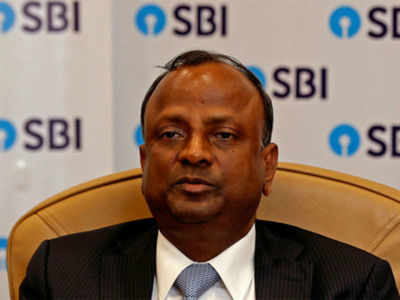

SBI chairman Rajnish Kumar (File photo)
NEW DELHI: Stating that there is a very thin line between risk aversion and risk prudence, State Bank of India (SBI) chairman Rajnish Kumar on Tuesday said the banks are ready to finance but there are no takers for bankable loans.
He also said the bank is very bullish about the Rs 3 lakh crore credit guarantee scheme for MSME (micro, small and medium enterprises), and through the scheme the government has indirectly infused Rs 30,000 crore into public sector banks.
Speaking about criticism for parking deposit money with the RBI, Kumar said, there is deluge of funds but there is no commensurate demand for loan.
So, banks have no choice but to park with RBI as there is risk aversion from the side of borrowers as well, he said while addressing India Inc at CII Annual meet.
“I hear a lot about risk aversion, but the dividing line between risk aversion and risk prudence is very thin. One question which I have been asking is — is there risk aversion only amongst lenders or there is risk aversion amongst borrowers also. Are they willing to leverage? Are they willing to invest?” he wondered.
Citing an example, he said, when the government slashed corporate tax rate drastically in September last year, many were of the view that investment will take place, but it has not taken place.
“As a banker and as the chairman of the largest bank, I am saying I have money, there are no takers of the money. Investment if you look in the last five years, the capex has gone down distinctly…no major projects have been announced. And by the way, the services sector particularly IT don’t consume any major capital,” he said.
Ultimately, he said, it is the manufacturing or infrastructure sector, which consumes money.
Between 2008 and 2015, it was the power sector which consumed maximum capital for putting up 75,000 MW capacity, he said.
Kumar said that the corporate sector should not expect much from the government but have to be self-reliant or “atmanirbhar”, given the fiscal position of the government.
“Maybe the corporate sector would have to look for all the opportunities themselves,” he said.
He also said that if more has to be given to the system, banks would require capital support from the government.
On the Rs 3 lakh crore credit guarantee scheme, Kumar said, risk weight for the scheme is zero and public sector banks do not have to provide any capital for this.
So, in a way there is indirect capital infusion of Rs 30,000 crore, he said.
“We are very bullish on this scheme. In a single day, we have disbursed 22,000 loans of worth Rs 3,000 crore. So, this is a very good scheme for supporting MSME sector,” he said.
The scheme is the biggest fiscal component of the Rs 20-lakh crore Self Reliant India Mission package announced by finance minister Nirmala Sitharaman last month.
Under the scheme, 100 per cent guarantee coverage will be provided by National Credit Guarantee Trustee Company (NCGTC) for additional funding of up to Rs 3 lakh crore to eligible MSMEs and interested MUDRA borrowers, in the form of a guaranteed emergency credit line (GECL) facility.
For this purpose, a corpus of Rs 41,600 crore was provided by the government spread over the current and the next three financial years.
The scheme will be applicable to all loans sanctioned under GECL facility during the period from the date of announcement of the scheme to October 31 or till an amount of Rs 3 lakh crore is sanctioned under GECL, whichever is earlier.
The main objective of the scheme is to provide an incentive to member lending institutions (MLIs) like banks, financial institutions (FIs) and non-banking financial companies (NBFCs) to increase access to, and enable availability of additional funding facility to MSME borrowers, in view of the economic distress caused by the COVID-19 crisis, by providing them 100 per cent guarantee for any losses suffered by them due to non-repayment of the GECL funding by borrowers.
All MSME borrower accounts with an outstanding credit of up to Rs 25 crore as on February 29 which were less than or equal to 60 days past due as on that date, ie, regular, SMA-0 and SMA-1 accounts, and with an annual turnover of up to Rs 100 crore would be eligible for GECL funding under the scheme.
Source link

